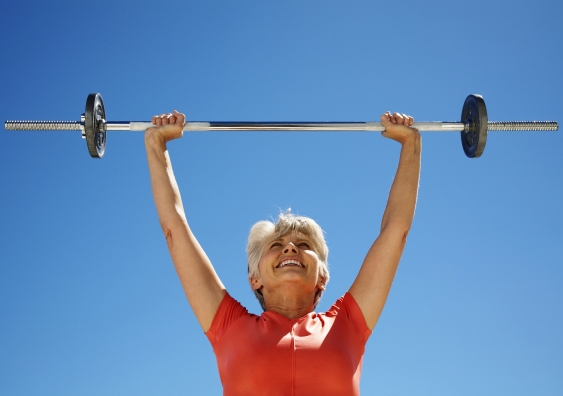Resistance is anything but futile
Weight-lifting can help over 55s improve brain function and muscle strength.
Weight-lifting can help over 55s improve brain function and muscle strength.

Over 55s with mild cognitive impairment can improve their brain function by building muscle strength, a new study shows.
Published in the Journal of the American Geriatrics Society, the research is a collaboration between UNSW’s Centre for Healthy Brain Ageing (CHeBA) and the universities of Sydney and Adelaide.
With 135 million people worldwide forecast to suffer from dementia by 2050, the study’s findings have implications for the type and intensity of exercise recommended for our growing ageing population.
Mild Cognitive Impairment (MCI) defines people who have noticeably reduced cognitive abilities, such as memory loss (a precursor to Alzheimer’s disease) but who are still able to live independently.
Now for the first time, a positive causal link has been established between muscle adaptations to progressive resistance training and the functioning of the brain among older people with MCI.
“The people I meet often ask me the question: what kind of exercise should I do to protect my brain? This study goes some way to answering this question, even though much further work remains,” said co-author Professor Perminder Sachdev, co-director of CHeBA.
The findings came from the Study of Mental and Resistance Training (SMART), a randomised, double-blind trial involving 100 community-dwelling adults with MCI, aged between 55 and 86. They were divided into four groups doing either:
■ resistance exercise and computerised cognitive training
■ training resistance exercise and a placebo computerised training (watching nature videos)
■ brain training and a placebo exercise program (seated stretching/calisthenics)
■ placebo physical exercise and placebo cognitive training.
The more we can get people doing resistance training like weight-lifting, the more likely we are to have a healthier ageing population.
Participants doing resistance exercise were prescribed weight-lifting sessions twice a week for six months, working to at least 80% of their peak strength. As they got stronger, the amount of weight they lifted on each machine was increased to maintain the intensity at 80%.
“The more we can get people doing resistance training like weight-lifting, the more likely we are to have a healthier ageing population,” said lead author Dr Yorgi Mavros, from the University of Sydney.
“The key, however, is to make sure you are doing it frequently, at least twice a week, and at a high intensity so that you are maximising your strength gains. This will give you the maximum benefit for your brain.”
The findings reinforced earlier research from the SMART trial, in which MRI scans showed an increase in the size of specific areas of the brain among those who took part in the weight-training program. These brain changes were linked to the cognitive improvements after weight-lifting.
The next step for researchers is to determine if the increases in muscle strength are also related to increases in brain size observed during the trial.
The SMART trial was funded by Australia’s National Health and Medical Research Council. – with UNSW Media and University of Sydney.